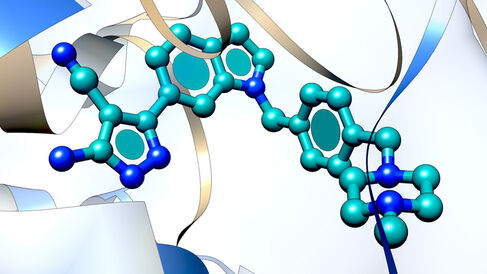
The Blundell Group and their collaborators have published an article in Nucleic Acids Research identifying a new class of antibiotics against mycobacteria that target tRNA methylation.
Anti-microbial resistance is a rising global healthcare concern that needs urgent attention as a growing number of infections are becoming increasingly difficult to treat with currently available antibiotics. This is particularly true for mycobacterial diseases, like tuberculosis and leprosy, and those with emerging opportunistic pathogens such as Mycobacterium abscessus, an intrinsically multi-drug resistant organism.
In their new study, the Blundell Group and their collaborators strive to address the challenge of anti-microbial resistance in mycobacteria by identifying new compounds that work through novel mechanisms of action not targeted by any of the currently used antibiotics. These compounds show potent bactericidal activity by inhibiting an essential bacterial tRNA modification enzyme (TrmD), thus representing a proof of concept for the development of a new class of mycobacterial drugs.
"The majority of current antibiotics act directly or indirectly through inhibition of protein synthesis, either by targeting ribosomal subunits in the case of the former or by inhibiting mRNA synthesis in the case of the latter. However, many clinically-relevant bacteria have developed resistance mechanisms to these antibiotics.
The beauty of our approach is that instead of inhibiting protein synthesis, like the majority of antibiotics do, these compounds still allow bacteria to synthesise their proteins, but mostly aberrant versions that will lead to futile cycles of protein synthesis, depleting cellular energy reserves and overwhelming the cellular protein quality control mechanisms. Although we have not looked into this, in our view, this research could be a path to help reduce the long treatment courses in mycobacterial diseases," said Dr Vitor Mendes and Dr Sherine Thomas, the postdoctoral researchers in Professor Sir Tom Blundell's laboratory who led the study.
TrmD (tRNA-(N(1)G37) methyltransferase) is a tRNA modification enzyme in bacteria that prevents +1 errors in the reading frame during protein translation. In this multidisciplinary study, the authors validated the essential role of TrmD in Mycobacterium abscessus growth by generating trmD gene knock-out bacteria. Then, using a rigorous small molecule fragment library screening and hit validation approach involving biophysical and crystallographic methods, identified 27 fragments that hit the TrmD enzyme. Two of the fragment hits were then merged chemically and further developed systematically. The lead development involved an iterative process consisting of structural, biochemical and biophysical studies to guide medicinal chemistry optimisation. The developed compounds show potent in vitro TrmD enzyme inhibitory activity, as well as inhibition of Mycobacterium abscessus in cultures and in a human macrophage infection model. Further, a preliminary cellular cytotoxicity study of two of the best lead compounds shows promising results. Interestingly, several of these compounds also exhibit pronounced inhibitory effects in Mycobacterium tuberculosis and Mycobacterium leprae suggesting the potential for novel broad-spectrum mycobacterial drugs.
